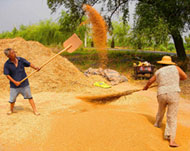Former Chinese minister charged
China’s former minister of land and natural resources has been charged with accepting bribes, the Beijing News says.

Tian Fengshan, 64, who was relieved of his duties as minister of land and natural resources in October 2003 after only seven months in office, was indicted on charges of accepting 5 million yuan ($619,000) in bribes, the newspaper reported on Monday.
Tian is the most senior official ensnared for graft since President Hu Jintao took office.
One-time governor of the northeastern province of Heilongjiang, Tian, who sat on the Communist Party’s elite 198-member Central Committee before his removal, could be sentenced to death if convicted, legal experts said.
Tian was taken into custody in 2003 after Wang Shenyi, former director of Heilongjiang‘s environmental protection bureau, informed on his ex-boss.
Wang was sentenced to 15 years in prison in July for accepting bribes.
Tian’s trial was expected to begin at the Beijing Number Two Intermediate People’s Court in the first half of 2006, the newspaper said. The court declined to comment.
Tian’s family and lawyer could not be reached.
State owned land
The Ministry of Land and Natural Resources is in charge of planning, management, protection and use of land, mineral and marine resources, according to the ministry website.
 |
|
Chinese farmers have protested |
All land in China is owned by the state, but a boom in commercial and residential property in big cities in recent years has fuelled corruption, with private developers bribing officials to change the designated use of farmland and residential property to commercial or industrial use.
Thousands of residents have been forced to relocate and farmland has been taken over for economic development zones that house factories. Many farmers have protested.
Chronic corruption
Corruption had been virtually wiped out in the years after the Communist Party swept to power in 1949, but has returned in the wake of economic reforms in the past 25 years.
China‘s leaders, including President Hu, have said that chronic corruption could topple the party, which has controlled the world’s most populous nation for more than 50 years.
The party has experimented with political and judicial reforms in recent years to try to find viable checks and balances to curb corruption, make the government more transparent and officials more accountable.
Cheng Kejie, a former vice-chairman of parliament, was executed in 2000 for accepting bribes, the most senior official put to death for corruption since 1949.